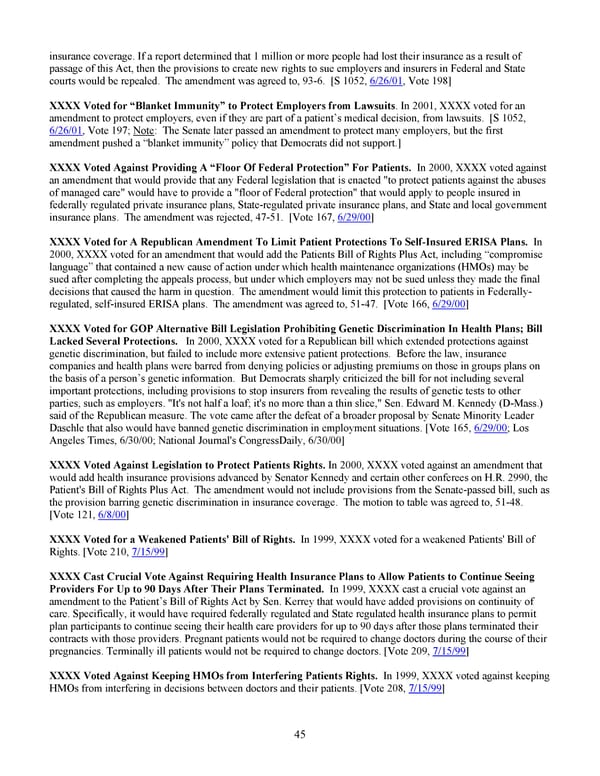insurance coverage. If a report determined that 1 million or more people had lost their insurance as a result of passage of this Act, then the provisions to create new rights to sue employers and insurers in Federal and State courts would be repealed. The amendment was agreed to, 93-6. [S 1052, 6/26/01, Vote 198] XXXX Voted for “Blanket Immunity” to Protect Employers from Lawsuits. In 2001, XXXX voted for an amendment to protect employers, even if they are part of a patient’s medical decision, from lawsuits. [S 1052, 6/26/01, Vote 197; Note: The Senate later passed an amendment to protect many employers, but the first amendment pushed a “blanket immunity” policy that Democrats did not support.] XXXX Voted Against Providing A “Floor Of Federal Protection” For Patients. In 2000, XXXX voted against an amendment that would provide that any Federal legislation that is enacted "to protect patients against the abuses of managed care" would have to provide a "floor of Federal protection" that would apply to people insured in federally regulated private insurance plans, State-regulated private insurance plans, and State and local government insurance plans. The amendment was rejected, 47-51. [Vote 167, 6/29/00] XXXX Voted for A Republican Amendment To Limit Patient Protections To Self-Insured ERISA Plans. In 2000, XXXX voted for an amendment that would add the Patients Bill of Rights Plus Act, including “compromise language” that contained a new cause of action under which health maintenance organizations (HMOs) may be sued after completing the appeals process, but under which employers may not be sued unless they made the final decisions that caused the harm in question. The amendment would limit this protection to patients in Federally- regulated, self-insured ERISA plans. The amendment was agreed to, 51-47. [Vote 166, 6/29/00] XXXX Voted for GOP Alternative Bill Legislation Prohibiting Genetic Discrimination In Health Plans; Bill Lacked Several Protections. In 2000, XXXX voted for a Republican bill which extended protections against genetic discrimination, but failed to include more extensive patient protections. Before the law, insurance companies and health plans were barred from denying policies or adjusting premiums on those in groups plans on the basis of a person’s genetic information. But Democrats sharply criticized the bill for not including several important protections, including provisions to stop insurers from revealing the results of genetic tests to other parties, such as employers. "It's not half a loaf; it's no more than a thin slice," Sen. Edward M. Kennedy (D-Mass.) said of the Republican measure. The vote came after the defeat of a broader proposal by Senate Minority Leader Daschle that also would have banned genetic discrimination in employment situations. [Vote 165, 6/29/00; Los Angeles Times, 6/30/00; National Journal's CongressDaily, 6/30/00] XXXX Voted Against Legislation to Protect Patients Rights. In 2000, XXXX voted against an amendment that would add health insurance provisions advanced by Senator Kennedy and certain other conferees on H.R. 2990, the Patient's Bill of Rights Plus Act. The amendment would not include provisions from the Senate-passed bill, such as the provision barring genetic discrimination in insurance coverage. The motion to table was agreed to, 51-48. [Vote 121, 6/8/00] XXXX Voted for a Weakened Patients' Bill of Rights. In 1999, XXXX voted for a weakened Patients' Bill of Rights. [Vote 210, 7/15/99] XXXX Cast Crucial Vote Against Requiring Health Insurance Plans to Allow Patients to Continue Seeing Providers For Up to 90 Days After Their Plans Terminated. In 1999, XXXX cast a crucial vote against an amendment to the Patient’s Bill of Rights Act by Sen. Kerrey that would have added provisions on continuity of care. Specifically, it would have required federally regulated and State regulated health insurance plans to permit plan participants to continue seeing their health care providers for up to 90 days after those plans terminated their contracts with those providers. Pregnant patients would not be required to change doctors during the course of their pregnancies. Terminally ill patients would not be required to change doctors. [Vote 209, 7/15/99] XXXX Voted Against Keeping HMOs from Interfering Patients Rights. In 1999, XXXX voted against keeping HMOs from interfering in decisions between doctors and their patients. [Vote 208, 7/15/99] 45
 HRC vote skeleton Page 51 Page 53
HRC vote skeleton Page 51 Page 53